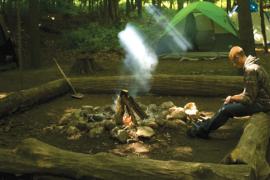Staff play an important role in your camp operation. After all, it is your staff who are in day-to-day contact with campers, facilitating the positive experiences of camp. Therefore, your staff must share your camp’s philosophy and be aware of the values that make your program unique. Collaborating effectively with your summer staff is a critical element in achieving your organization’s goals and objectives.
The Philosophy Behind the Mission
Most organizations today have developed a formal mission statement that describes the core values or purpose of their organization and the objectives that define achievement and success. Some camps, such as Sunny Skies Day Camp, have a camp philosophy in lieu of a formal mission statement:
"Camp is more than just a fun way for kids to spend their summer; camp is a place where we can make a positive difference in young people’s lives. All of the activities at camp are tools that provide opportunities for children to participate, build new skills, and form friendships. If our staff is successful, campers will gain self-esteem and self-confidence through their experiences and adventures at camp."
Staff Play a Critical Role
Staff play a critical role in making camp more than just a fun way for kids to spend their summer. The work staff members do (or don’t do) determines the organization’s success or failure. For the program to be successful, camp directors depend on the staff members to implement the camp philosophy. How can you select and train your staff to accomplish this task? You must become skilled at marketing to your staff!
Interview with your mission in mind
Marketing to staff begins during the hiring process. Staff interviewing and selection should be based on your program’s philosophy in an effort to screen and hire those candidates who want (and are able) to fulfill the goals and objectives that you have set forth. In order to accomplish this, interview questions must be designed with your camp’s mission in mind; an applicant’s response to well-created interview questions should allow you to compare the goals and objectives of the prospective staff person with that of your program.
One question that you should ask in order to get a sense of a candidates’ perspective on the value of camp is "If you ran a summer camp, what would be some of your goals and objectives?" Another important question to ask is "What do you think children can gain from a summer camp experience?" While fun is certainly a good start to answering both of these questions (and you should be concerned if fun is not included in the answer), what else does the candidate think is important? Look for answers that include: "learning skills," "making new friends," "being part of a positive group experience," "gaining independence," and "becoming more self-confident." The candidate’s answers to these types of questions will begin to indicate whether this prospective staff person envisions the camp experience congruously with the objectives of your camp vision.
Later in the interview, you can begin to share your camp’s philosophy with an applicant by asking "Do you think children can gain self-confidence or self-esteem from a summer camp experience?" (Granted, this is a loaded question!) After they inevitably answer "yes," follow up with much more challenging and revealing questions:
- How can a child gain self-esteem from summer camp?
- Does the staff play a role in allowing that to occur?
- How would you as a counselor try to build a child’s self-confidence?
- Do you think there is a recipe for helping to build children’s self-esteem?
During interviews, ask questions in an attempt to determine if there is the possibility of a successful match between your organizational goals and the goals of the prospective staff member. As an employer, the first step is to be sure that your interview questions are geared toward your program’s particular philosophy.
Teach staff your camp's vision
After you have selected those individuals who you feel will embody your organization’s core values, the next step is to educate and train your staff in detail about the program’s mission and what role they will play in achieving it. At this point, marketing your mission to your staff should be a relatively easy sell in that one benefit of an effective hiring process is that your staff should already share the values and goals that define your mission — if you have done your job in hiring staff, then your organizational mission should be, at least in part, their personal mission!
Staff training is a time to provide your staff with a recipe for how to incorporate the mission into each and every camp activity. For example, when some camps train their staff to facilitate a canoeing program, the program leaders are careful to talk about and role play exactly how this program fits into the camp’s philosophy (in addition to teaching the procedural elements of canoeing and safety).
It’s no coincidence that their canoes seat four campers and that sometimes only two paddles are in each canoe. While canoeing may be about rowing a boat in a body of water, for this program canoeing is really all about working in groups, communicating with friends, sharing paddles when mysteriously there are not enough to go around, feeling good about oneself from the experience . . . and, of course, it’s also a lot of fun!
In slightly different ways, each activity area at camp exists as an important tool through which your program’s goals can be achieved. Your job during staff training is to illustrate just exactly how each activity fits into the camp philosophy and then to teach staff how to facilitate each activity in a way that will put the philosophy into action.
Achieving a Common Purpose
Once the camp season is under way, one of the really beneficial aspects of having a clearly defined and well-understood camp philosophy is that the entire staff, directors and owners included, work toward the same common purpose. Unlike a more traditional top-down approach where subordinates work for their supervisors (or perhaps work for money), working to achieve your camp philosophy creates a feeling in camp that all of your staff, from your maintenance staff and group counselors all the way to your directors and owners, ultimately are working for the children.
Working toward and accomplishing a common purpose is a positive and incredibly powerful way to motivate staff. (Over the years, many camps have found that a valued common purpose is far more meaningful to staff than money.) There is probably nothing more motivating or more rewarding in the world than enabling, empowering, and coaching people to reach goals that they themselves hoped to achieve. By uniting your staff with a common purpose, you have managed to create a staff that is feeling rewarded and successful as individuals while simultaneously achieving your organizational goals and objectives.
Staff evaluation becomes easier
During the course of each summer, collaborating with staff should play an important role in staff evaluation and supervision. Supervising and evaluating staff is easier when the organization and the employee both have a clear understanding of what the particular goals and objectives are; a performance evaluation should relate the job being done by the staff member to the goals and objectives that comprise your camp’s mission or philosophy (among other things).
A successful and effective staff member, no matter his particular role, should be doing a job that contributes toward the program’s overall goals. For a group counselor, this obviously means working effectively with the group to provide experiences that meet the requirements set forth in the mission statement; in the case of a maintenance person, this could entail noticing that a particular piece of play equipment has an exposed nail and correcting the problem before anyone is injured by it.
Praise staff with specifics
While different roles in camp necessitate different actions toward achieving the program’s goals, staff members need and deserve to know how they are doing individually in accomplishing those goals. Those who are successful in meeting or exceeding your expectation need to know it — tell them personally or write them a quick note explaining exactly how they are achieving some of your organization’s goals and values. The more specific you can be in your praise, the more likely they will continue that positive action. Positive feedback will also allow them to gain self-confidence in their abilities which, in turn, will help them perform their camp job even better.
Don't accept low achievers
That’s all well and good for the superstar counselor, you may be thinking, but what about those who are not achieving as well and not helping your organization achieve its goals? In many ways, the job that you do as a manager will be defined more by how you handle the difficult challenges of managing underachieving staff than by how you pat your superstars on the back. No manager likes terminating staff, but it is an extremely important tool in marketing your organization’s missions and values to your staff. If your entire camp program revolves around your staff’s ability to have positive relationships with and build self-esteem in children, what does it say to the rest of your staff if you allow a staff person who is negative and demeaning toward campers to continue to work in your program? On the other hand, what does it say if you don’t allow that person to continue as a member of your staff? As difficult as it is, terminating the employee who does not live up to your camp’s mission plays a critical role in this marketing effort.
Practice What You Preach
Finally, it is important to recognize that there is a profound parallel that exists in camp management. You ask your staff to accomplish specific goals in the ways that they work with children in their groups or at their activity areas. You want them to praise children with high fives and kind words; get children’s attention by hand claps or techniques such as seeing if their group can form a line in less than six seconds; and discipline them using specific positive discipline guidelines.
As directors and managers, you must practice what you preach! Your relationship with your staff is a direct parallel to your staff’s relationship with campers — staff members are your group to coach, build, and develop. The very best example that you can set for your staff is to always provide the ultimate model of your organizational mission and values.
Originally published in the 1999 September/October issue of Camping Magazine.



